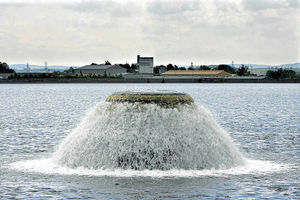Profits on tap for Severn Trent as rivals dive in
At a time when investors all over the world are looking for a safe and secure home for their money, British water companies appear a very good bet indeed.
That is why the consortium currently offering around £5 billion for Severn Trent is not going away soon, despite being turned down twice.
Everyone needs water, and British water companies are prized by investors such as pension funds, sovereign wealth groups and private equity firms because they have a monopoly over customers and relatively stable earnings, which are tied to inflation.
While their price increases are limited by water regulator Ofwat, they are virtually guaranteed an inflation-linked price hike every year as long as they show willing by investing in their pipes and pumping stations and cut their leaks.
Severn Trent is the latest British utility to attract interest after buyouts for rivals Yorkshire Water, Northumbrian Water and Thames Water.
After water privatisation by Mrs Thatcher in 1989, there were 10 water companies on the stock market. Today, there are just three: Severn Trent, United Utilities and Pennon.
Walsall-based South Staffs Water was originally taken private in 2004 by Arcapita Bank of Bahrain, was later bought by Alinda Infrastructure Fund and last month was bought in turn by American multinational private equity firm KKR & Co – formerly known as Kohlberg Kravis Roberts & Co
When Severn Trent spurned a £4.96 billion offer from the LongRiver consortium yesterday it said the bidders were undervaluing the business.
It was the second time LongRiver – made up of Canadian investment group Borealis, the Kuwait Investment Office and the UK's universities' pension scheme – had been rebuffed.

Severn Trent argues that it is investing in its network, providing good customer service and has given its shareholders a return of 72 per cent on their investments since April 2010. As a result, shares in Severn Trent, which supplies 4.2 million households and businesses across the Midlands and parts of Wales, have risen from £12.08 three years ago to £18.25 the day before it was revealed LongRiver wanted to buy the business.
Just a week ago the company revealed underlying pre-tax profits slipped 3.3 per cent to a worse-than-expected £266.3 million in the year to the end of March after it hiked investment in its network by 17 per cent to £555 million. At the same time Severn Trent said commercial customers, such as farmers, used less water during a rainy summer – hitting water consumption by 1.4 per cent. Despite this Severn hiked its full-year dividend by 8.2 per cent and said dividends will grow six per cent in its new financial year. Severn Trent chairman
Andrew Duff said LongRiver's offer 'fails to value the attractions to Severn Trent's shareholders of Severn Trent's increasingly rare combination of yield, inflation-linked business model and potential'.
UBS analyst Stephen Hunt believes a fairer price would value Severn Trent at more than £5.1 billion. He said:"I would have expected them to come a little bit closer to that valuation, but I think that they're pretty close to the number so I think that a third and final offer that is accepted is certainly not off the cards."
But there were signs of impatience from one of the bidders. Commenting on behalf of the consortium, Michael Rolland, president and CEO of Borealis, said: "LongRiver is surprised and disappointed at the reaction of the Severn Trent board."
If the two sides cannot reach an agreement, the bidders might decide to sidestep Severn Trent's board and go direct to the shareholders with their offer – effectively mounting a hostile takeover bid.
That would prove expensive for both sides – bills in the tens of millions of pounds rapidly rack up in those kinds of battles.
But it is clear LongRiver wants Severn Trent, and it still has until June 11 to move.
Borealis already co-owns the UK's biggest ports operator Associated British Ports and the London to Paris High Speed 1 rail line. The Kuwait Investment Authority invests the emirate's oil wealth, while the Universities Superannuation Scheme invests the pensions of UK higher education workers.
They are investing for the long term, and over the long term Severn Trent looks good.





